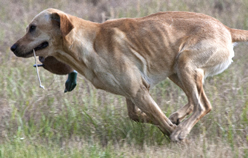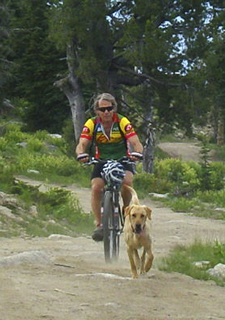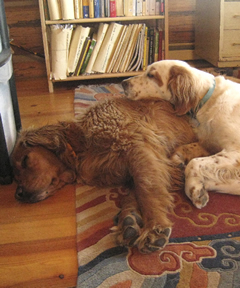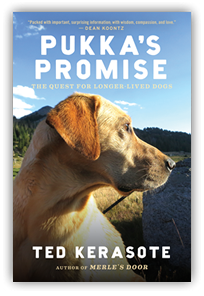Healthy Dogs
 In the months following the publication of Merle's Door, I received hundreds of emails from readers who had lost beloved dogs and closed their letters with a variation on this theme: "Why must our dogs die so young?"
In the months following the publication of Merle's Door, I received hundreds of emails from readers who had lost beloved dogs and closed their letters with a variation on this theme: "Why must our dogs die so young?"
Naturally, when most of us say this, we're not expecting an answer. We're expressing a rhetorical complaint: "Why do our best friends in the animal kingdom live so much such shorter lives than we do, only about an eighth of the normal life expectancy of a person in the developed world?"
However, I also received another question from many readers, which was more particular in its nature and much more heartrending: "Why did my dog have to die of cancer at three years old...at four...at six?" "Why," as one person wrote, "have four of my five Golden Retrievers died of cancer?"
 What are the key elements of having a long-lived, healthy dog? Here are some pointers.
What are the key elements of having a long-lived, healthy dog? Here are some pointers.
One of the most comprehensive sources of information about keeping dogs healthy is Dr. Karen Becker's website: https://drkarenbecker.com/.
Contaminants
Don't expose your dog to environmental pollutants, particularly the herbicides and pesticides that are applied to lawns and golf courses.
Nutrition
Rotate your dog's food on a weekly or monthly basis. Would you be healthy if you ate the same thing your entire life? Reduce the carbohydrates your dog eats (corn, oats, soy, barley, rice) and replace it with high-quality protein.
Helpful Links: The recommendations of an increasing number of veterinarians as summarized by Dr. Marty Goldstein and Dr. Karen Becker.
 Vaccinations
Vaccinations
My recommendation, gleaned from interviews with such canine vaccine experts as Dr. Ron Schultz and Dr. Jean Dodds, is not to vaccinate a puppy until 16 weeks of age (it still has maternal immunity). At 16 weeks of age, vaccinate your pup against parvovirus and distemper, and at 20 weeks of age vaccinate it against rabies. Three weeks later have your vet draw a blood sample and send it to Michigan State University’s Veterinary Diagnostic Laboratory for a Canine Vaccine Antibody Panel, which will titer the sample, in other words, measure the concentration of antibodies in the sample to determine if your pup now has immunity to these diseases. If the titer is positive, you can call it done. If the titer shows insufficient immunity to either parvovirus, distemper, or rabies, your vet will need to booster these vaccinations.
Unless you board your dog in crowded conditions, I would forego vaccinating it against kennel cough. Unless you live in a warm, wet, tropical climate, I would also forego vaccinating it against leptospirosis. In the colder parts of North America, heartworm medication is unnecessary. Even in the warmer Southeast, it need not be given every month. See pages 89–90 of Pukka’s Promise for full details.
A rabies vaccination for canids is required every three years in virtually everywhere in the United States, but other vaccinations are not. If your dog continues to show positive titers for parvovirus and distemper, it’s a waste of money, and an unnecessary challenge to your dog’s immune system, to vaccinate it every year. If your vet pressures you to do so, find a new vet. Ontario requires resident dogs to be vaccinated against rabies; in other provinces a rabies vaccination is optional.
Genetics
If you're looking for a new dog, and are getting it from a breeder, take a close look at the dog's family tree, finding out how long its ancestors lived and what they died of. Use Rodney Habib’s and Dr. Karen Becker’s "Twenty Questions to Ask A Prospective Breeder" to judge the breeder’s dedication to producing healthy, long-lived dogs: https://foreverdog.com/wp-content/uploads/2023/01/Twenty-Questions-to-Ask-a-Prospective-Breeder.pdf.
Spaying and Neutering
There is a growing body of scientific evidence showing that spayed and neutered dogs have higher incidences of some cancers, orthopaedic injuries, incontinence, obesity, and behavioral problems than intact dogs or dogs who have received alternative forms of canine birth control: ovary-sparing spays or vasectomies. Consider leaving your dog intact or giving it one of these two forms of birth. To find a vet who performs ovary-sparing spays or vasectomies, see this state by-state and provincial listing: https://www.parsemus.org/project/hormone-sparing-sterilization-procedures/.
Many vets will recommend spaying all female dogs not used for breeding, since removing her ovaries almost completely eliminates her risk of her developing mammary cancer. However, the risk of developing mammary cancer is breed-dependent. Some breeds, like English Spring Spaniels and Boxers, have a very high risk; Labrador and Golden Retrievers a medium risk; and Bernese Mountain Dogs and Newfoundlands a very low risk. For a table showing the risks of each of 53 breeds, see page 114 of Agneta Egenvall, et al., “Incidence of and survival after mammary tumors in a population of over 80,000 insured female dogs in Sweden from 1995 to 2002”:
Helpful Links: "Long-Term Health Risks and Benefits Associated with Spay/Neuter in Dogs", by Laura J. Sanborn
Gerald P. Murphy Cancer Foundation - Ovaries & Longevity
A good scientific overview on spay/neuter
To find a vet that performs ovary-sparing spays or vasectomies, see this state-by-state and provincial listing. Not all states and provinces are listed, as we were unable to find vets who perform these procedures in every state and province.
 Catching Cancer Before it Spreads
Catching Cancer Before it Spreads
Run your hands over your dog every day. The instant you feel a lump take your dog to your vet and get the lump aspirated and an analysis made of its contents. If your veterinarians says, "Let's watch it," find a new vet. Tens of thousands of dogs needlessly die of cancer each year because their humans "watched" a lump that could have been easily removed before the cancer metastasized.
What do I do if my dog gets cancer?
When humans get cancer, they seek specialized care. So, too, should it be with dogs. To find a canine oncologist in your area search the Pet Cancer Center Website: https://www.petcancercenter.org/Veterinary_Oncologists_US_p1.html#CO
Managing Late-onset Laryngeal Paralysis
An estimated two million North American dogs suffer from Late-onset Laryngeal Paralysis—also known as GOLPP (Geriatric Onset Laryngeal Paralysis and Polyneuropathy). It’s a common, degenerative neurologic disease that affects older, medium- and large-breed dogs, causing difficult, noisy breathing, regurgitation, and hind-end weakness. An estimated 50 percent of Labrador Retrievers over the age of eleven can develop laryngeal paralysis. Golden Retrievers are also affected, as are Newfoundlands, Borzois, Greyhounds, German Shepherds, and mixed breeds.
My strategy for managing what I’ll call “LarPar" has three elements—nutrition, mobility, and psychological enrichment.
NUTRITION
Dogs with laryngeal paralysis often cough or gag while eating or drinking, as the degeneration of the laryngeal nerves affects the esophagus as well as the larynx, decreasing its motility and slowing the passage of food to the stomach. These symptoms are often indistinguishable from the condition known as megaesophagus, and many of the strategies that help a dog with esophageal dysmotility will also help one with LarPar.
Initially, elevating the dog’s bowl on a low table will help it to swallow, but as the syndrome progresses, feeding a dog in a vertical position, or as near to vertical as possible, will enable gravity to assist the movement of food through the esophagus and into the stomach. A high chair, which supports the dog in an upright position, greatly facilitates feeding in this way. You can build your own or get one custom-made at Bailey Chairs 4 Dogs: https://www.baileychairs4dogs.com/.
Modifying your dog’s diet may also prove helpful. When Pukka developed LarPar, he could no longer swallow his daily raw turkey neck—it made him choke, even if I chopped it into small pieces. Moreover, he couldn’t digest his usual meals of raw meat and vegetables, and I had to switch to softened, low-fat kangaroo kibble, and then to a combination of a canned GI-formula food alternated with steamed ground elk made into small meatballs that would easily slide down his gullet. Since Pukka was having trouble digesting even cooked vegetables, I fortified his elk meat with a meal mix containing essential nutrients and originally formulated by Dr. Karen Becker: https://www.barkandwhiskers.com/meal-mix-for-dogs/.
Moistening the meatballs with chicken broth helped to hold them together while also providing a new flavor. I would hand-feed Pukka these meatballs, one at a time, waiting thirty seconds between offering him each one, a strategy that cut his gagging by nearly 100 percent.
The biggest game changer for Pukka was using sildenafil (i.e., Viagra), which relaxes the smooth muscle of the lower esophageal sphincter, allowing easier passage of food to the stomach. Here is a link to the original study on sildenafil’s beneficial effects for dogs with esophageal dysmotility, published in the journal of the American Veterinary Medical Association: https://avmajournals.avma.org/view/journals/ajvr/83/4/ajvr.21.02.0030.xml.
Sildenafil, of course, needs to be prescribed by your veterinarian and given in a dosage appropriate to the size of your dog. In Pukka’s case, 30 mg of sildenafil, three times per day, eliminated his regurgitation and gave him and me peaceful nights of sleep.
A third helpful addition to Pukka’s diet was using a human food and beverage thickener for people with dysphagia, called Thick.It: https://thickit.com/. Moderately thickening Pukka’s water, and holding his bowl in front of his mouth and letting him drink small amounts at a time while he sat in his Bailey Chair, prevented him from choking.
MOBILITY
One of the most heartbreaking aspects of late-onset laryngeal paralysis is seeing one’s formerly active dog become increasingly limited in what it can do. This is a result not only of the laryngeal nerve degenerating, causing noisy, difficult breathing, but also of the femoral and sciatic nerves being compromised, leading to hind-end weakness, wobbliness, and difficulty getting up and walking.
Three pieces of equipment in the LarPar armamentarium will prove indispensable in helping your dog. The first is the Help ‘Em Up Harness, https://helpemup.com/, which has grab loops fore and aft. It will help you lift your dog off the floor, guide it up its ramp into the car, and, as the syndrome progresses and wobbliness increases, steady the dog’s hind end while you walk alongside it.
You can delay the implementation of the Help ‘Em Up Harness by outfitting your dog with Orthopets’ Toe-up Booties: https://www.orthopets.com/shop/toe-up-device-with-boot. These nonprescription devices have an elastic cord that runs from the toe of the bootie to a Velcro-secured collar that wraps around the dog’s upper leg, preventing the dog from dragging its knuckles and greatly restoring its normal gait. In Pukka’s case, it cured his abraded and bleeding toes and allowed him to go from limping his way through a few-hundred-yards walk to resuming his mile loop around the village.
The third piece of equipment that will make your dog’s life easier is a ramp for getting into and out of your car, your boat, or up and down a short flight of stairs. After trying half a dozen ramps, my favorite is the three-piece Subaru Pet Ramp. It compresses into a short length, will support a 220-pound dog, has excellent traction, and is nearly indestructible: https://www.subaruonlineparts.com/sku/soa733p100.html...
Despite using these aids, you may notice that your dog has difficulty breathing while walking, especially when the weather is hot. An effective way of cooling your dog is Ruffwear’s Swamp Cooler Cooling vest: https://ruffwear.com/products/swamp-cooler-dog-cooling-vest. You soak it in cold water, put it on your dog, and through evaporative cooling, the vest lowers your dog’s temperature by ten degrees.
Dogs whose breathing becomes severely compromised could be candidates for what is called “tie-back surgery.” The larynx has two lateral gates, the arytenoid cartilages, which open during inhalation and close while swallowing. Because LarPar weakens the nerves controlling these gates, they can stay partially closed when the dog tries to breathe, causing a wheezing sound known as “stridor.” Dogs whose arytenoid cartilages close dramatically can struggle mightily to breathe, their tongue and lips turning blue from lack of oxygen.
Tie-back surgery pulls one half of the arytenoid cartilage laterally and sutures it in place, keeping the airway open. However, because the airway is now open, the dog can aspirate food into its lungs, causing pneumonia. In addition, because LarPar affects older dogs, the general anaesthesia required for the surgery poses some risk. One study showed a 34 percent complication rate after tie-back surgery and 24 percent of the dogs developing aspiration pneumonia, https://avmajournals.avma.org/view/journals/javma/218/12/javma.2001.218.1949.xml; another study showed that only 10 percent of the dogs developed pneumonia: https://pubmed.ncbi.nlm.nih.gov/20610696/.
Because of all the other strategies I used to help Pukka remain mobile, he didn’t exhibit difficulty breathing until well into his 15th year, and at that point, I didn’t want to expose him to general anaesthesia or a long post-operative recovery. If you’re considering tie-back surgery for your dog, it pays to seek out a surgeon who has done the procedure many times and has a high success rate.
As a dog affected by LarPar becomes more unsteady on its feet, you can help it move around the house with more confidence by laying down carpet runners over smooth wood or concrete floors and also putting them on stairs. In addition, because LarPar affects older dogs, these animals may also be losing their eyesight. Since dogs see the color blue more vibrantly than other colors in their visual spectrum, placing blue masking tape on the top and outer edge of each step will help your dog to navigate them.
Last, consider having your dog evaluated by a certified canine physical therapist and implementing a program of therapeutic exercises, massage, stretching, laser therapy, acupuncture, and electrical stimulation from a TENS unit (transcutaneous electrical nerve stimulation) as well as electromagnetic stimulation from an Assisi Loop: https://assisi.zomedica.com/products/loop/. Pukka’s home PT program was designed by Sash Foster at Colorado State University, https://sashaafoster.com/, but most major veterinary teaching hospitals will have such a specialist. You can also search for one at the Canine Rehabilitation Institute: https://www.caninerehabinstitute.com/find-therapist.
PSYCHOLOGICAL ENRICHMENT
Essential to keeping a dog with LarPar mentally fulfilled is continuing its favorite activities as long as possible, whether it’s retrieving, herding, agility, scent work, walks in the park, or swimming. For the latter, a canine life jacket can let a dog with a compromised hind end paddle with renewed confidence. A life jacket with a grab loop at the center of the back enables you to wade alongside your dog and give it an assist if needed.
However, helping a LarPar-compromised dog continue its favorite recreational activity may be more difficult for the human than for the dog. This was my experience—I found it difficult to dial back my expectations of what Pukka could do, as I was used to his being a superb athlete, a dog who could find and retrieve a downed pheasant from half a mile away across a cornfield, chase down a ball lofted a hundred yards with a Chuckit launcher, and leap as high as my head to snag a Frisbee on the fly.
Watching him decline crushed my spirit, but not his. He accepted his decreased mobility with grace, taking deep pleasure in what he could still do: flushing and fetching his last grouse at the age of thirteen, enjoying his retrieves even if they were no more than a short toss down the runner in our living room, and walking alongside me as I shuffled along at his pace on my Nordic skis, he grinning up at me with a look that said, “Ah, skiing, Ted! What could be better!” As is so often the case, our dogs teach us more than we teach them.
One caveat about walking with your LarPar-debilitated dog is worth mentioning: other dogs will sense your dog’s weakness and may gang up on it. You need to become hyper-vigilant as to which dogs are going to take advantage of your compromised dog, and either keep your pooch away from them, or if you’re suddenly confronted by a dog intent on harming your pup, know how to defend it. This can be daunting if the aggressive dog is a 120-pound Malamute or Akbash who has ripped its leash from its person’s hand and is barreling towards you with murder on its mind.
After having Pukka attacked on four different occasions, and being bitten twice while trying to defend him, I took to carrying pepper spray, the same one I use in case of a grizzly bear attack. Of course, I didn’t want to pepper spray a neighbor’s dog, but when it came to Pukka being killed or pepper spraying the attacker, I wouldn’t hesitate.
Given the progressive nature of LarPar, there may come a time when your dog can no longer walk. For many people, this is an indication that their dog is no longer enjoying life and should be euthanized to end its suffering. I chose to take a different course with both Merle and Pukka when they became non-ambulatory.
Both of them spent their last weeks lying under our aspen trees, watching the mountains they loved. In Merle’s case, I carried him outside. Twenty years later, my lower back wouldn’t allow me to easily pick up a 70-pound dog, so I slid Pukka onto a low-sided game sled, hauled him outside, and gentled him onto the grass so he could enjoy the spring breeze with a wide grin. This particular sled, made by Terrain, works well for moving a dog who can no longer walk: https://www.terrainhunting.com/products/deer-drag.
Dogs succumbing to LarPar may also become incontinent and managing the mess can be both disheartening and labor-intensive. These Frisco Giant Eco-Conscious Dog Training & Potty Pads facilitate an easy cleanup and also help to keep a bed-bound dog clean: https://www.chewy.com/frisco-giant-eco-conscious-dog/dp/336097. Honest Paws Dry Shampoo works well to clean up minor messes on a dog’s coat without having to constantly bathe the dog: https://www.honestpaws.com/products/dry-shampoo-for-pets?_pos=1&_psq=dry+sh&_ss=e&_v=1.0&variant=43758604877993.
IN CLOSING
There’s no way to soft-pedal how much time, energy, and dedication it takes to manage a dog who is becoming increasingly debilitated by LarPar. You have to be aware of what your dog needs on any particular day: how much exercise it can tolerate; how much recovery time is in order; how to vary its diet as it grows dissatisfied with its food; and how to keep it engaged as its physical powers decline.
Of course, all the protocols I’ve mentioned have far more power when underlain by the enduring love that first brought you and your dog together. More than ever, your dog with LarPar needs to feel wanted, even though it’s no longer in its prime. In this vein, taking your dog with you wherever you go helps to reinforce that your love for your soulmate hasn’t faded.
How many times did I turn to Pukka as he lay behind me in the car or in my office, and say, “Oh, who is the best dog in the world?” His eyes brightened at the familiar refrain, and I’d exclaim, “Oh, he’s right here!” And thump, thump, thump went his tail.































